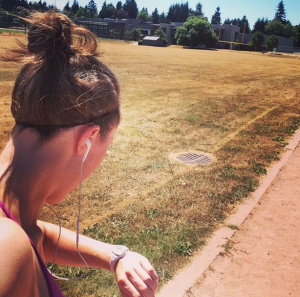 Erik Bies is a Doctor of Physical Therapy at Movement Systems Physical Therapy off Eastlake in Seattle, is a former NCAA All-American collegiate middle distance runner and NCAA coach with a Master’s degree in Exercise Physiology and Biomechanics. He “developed the Transformative Running Project as a 1-on-1 mentorship program combining my expertise in rehabilitation and training distance runners to mentor individuals to experience consistent, injury-free running to boost clients towards their goals and facilitate the dramatic effect that movement has on wellness. I believe whole-heartedly in the concept of the unique individual experience when it comes to guiding people toward personal bests, personal success, and wellness.” In his latest blog post, Bies discusses MENTAL HURDLES FOR NEW RUNNERS. To access more of his blog posts and expertise see his website HERE.
Erik Bies is a Doctor of Physical Therapy at Movement Systems Physical Therapy off Eastlake in Seattle, is a former NCAA All-American collegiate middle distance runner and NCAA coach with a Master’s degree in Exercise Physiology and Biomechanics. He “developed the Transformative Running Project as a 1-on-1 mentorship program combining my expertise in rehabilitation and training distance runners to mentor individuals to experience consistent, injury-free running to boost clients towards their goals and facilitate the dramatic effect that movement has on wellness. I believe whole-heartedly in the concept of the unique individual experience when it comes to guiding people toward personal bests, personal success, and wellness.” In his latest blog post, Bies discusses MENTAL HURDLES FOR NEW RUNNERS. To access more of his blog posts and expertise see his website HERE.
MENTAL HURDLES FOR NEW RUNNERS
1) Creating the habit. The first big hurdle is the mental and behavioral aspect of starting something new and sticking to it. Let’s face it, running is an absurd activity. But so is anything that is challenging. Like anything though, the more you practice the activity, the easier it gets. Creating the habit requires mental toughness and a plan. There are no shortcuts, but you can make a new habit stick by cueing yourself through a variety of strategies: 1) sleep in your running clothes 2) leave running shoes in front of your bedroom door 3) buy yourself a running gadget, so you are committed to using it 4) reward yourself if you must 5) set a goal(s) 6) Train with a buddy to create accountability.

2) FEAR of discomfort (pain). Running can be painful, but it does not have to be! If you take nothing else away from this article remember this: Learning to run relaxed at any speed is the key to unlocking all that is positive about running. Unfortunately, the thought of running can create fear. The perfect example is how “ball sport” coaches ‘unintelligently’ use running as punishment rather than positively reinforcing the behavior of running through slight discomfort. Running should be viewed positively and science proves its benefit when running at any level. The pain gets less and less with practice, and the sense of reward increases. The greater one’s fitness, the more one craves harder efforts. Pushing your level of discomfort and adapting to it is a positive experience.

3) Patience: Can you delay gratification? Are you a spender or saver? Are you Veruca Salt or Charlie Bucket (see Charlie and the Chocolate Factory)? Running success comes to those who are patient. This is the reality. Aerobic development takes time. Skill acquisition takes time. Impact-proofing your body, specifically to running, takes time. Regularly running too hard or routinely testing your limits increases your risk for injury. My advice to new runners is to treat running like saving money. View each run as a small investment… “money in the bank,” or “hay in the barn.” Focus on running for time, not pace or distance. Maximizing ones potential takes years. Enjoy the experience celebrating the short-term goal achievements and milestones, but expect there will be setbacks. It will take time to run further, and to run faster.

4) Making comparisons: Humans naturally compare things. It’s how we make sense of our world. “It’s all relative,” they say. Well, it is hard not to compare oneself to others and oneself to oneself. New runners must learn what comparisons are relevant and when they are relevant. This requires experience. The experienced runner has a good sense of body awareness and can compare a given effort to an expected performance. The new runner wants to compare every run by time or by pace. This is a mistake. Training is non-linear, and focusing on performance of each run can lead to overtraining.

5) Bending the rules and adapting training: Novices like to follow rules and stay well within the lines. Everyone wants a plan because it is easy to believe, “If I do X, then I will achieve Y performance.” When it comes to training, there is a lot of gray area. Finding one’s training rhythm requires trust in adapting training. Trust comes from experience. This is where having a knowledgeable coach or running mentor can make a difference in your running experience. Based upon one’s personality, he/she may end up overtraining or undertraining. The best training rhythm is individualized based on basic principles, but the rules can be bent. It is an art, and perfecting it is what makes running constantly challenging and rewarding.
To sum up: Patience and consistency are paramount. Measure progress in months and years, not weeks. Allow the power of cumulative efforts to build fitness over time, and avoid constantly comparing one run to the next. Be willing to deal with some short-term discomfort for longer terms gains. Cultivate the ability to feel relaxed and in control at any level of effort. Remember, running is a positive experience, not punishment! Don’t overcook your goose. Be flexible when following “a plan.” Adapt your training to keep yourself going. JUST GET STARTED and experiment to find the rhythm of harder work and recovery that works for you. Learn from an experienced runner if you need guidance. View the entry HERE!